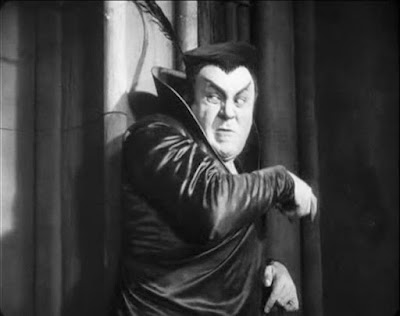As the days grow shorter, and the list of screenings for Halloween grows longer.
Tonight, it's Murnau's 'Faust' (1926), which I'll accompany at the Flying Monkey Moviehouse and Performance Center in Plymouth, N.H. Showtime is 6:30 p.m.
See you there! Lots more info in the press release below.
For now, a brief report on the first of several 'Nosferatu' (1922) screenings coming up in the next two weeks.
With this year marking the 100th anniversary of the film's release, interest is heavier than usual.
Last Sunday afternoon, I accompanied 'Nosferatu' to the largest crowd we've attracted so far to the silent film series at the Center for the Arts in Natick, Mass.
The Center for the Arts screening room just before 'Nosferatu.'About 40 people took in the film, with many staying afterwards for an extended question-and-answer session.
Most had never seen 'Nosferatu,' so I need to keep that in mind when I start thinking that the film gets programmed too often.
'Faust' certainly doesn't run as often, so if you're interested in seeing Murnau's last film made in Germany prior to his move to Hollywood, join us this evening.
Here's the press release:
* * *
An original German poster for F.W. Murnau's adaptation of 'Faust' (1926).TUESDAY, SEPT. 20, 2022 / FOR IMMEDIATE RELEASE
Contact Jeff Rapsis • (603) 236-9237 • jeffrapsis@gmail.com
Rarely shown 'Faust' adaptation on Wednesday, Oct. 19 at Flying Monkey
Silent film thriller starring Emil Jannings to be shown on the big screen with live music for Halloween program
PLYMOUTH,
N.H.—It's been a novel, a stage play, and an opera. When movies first
appeared a century ago, it was only a matter of time before they tackled
'Faust,' the tale of a man who consigns his soul to the devil to obtain
power in the present.
At the height of the silent era, German
director F.W. Murnau created a cinematic version of 'Faust' filled with
stunning images that maintain their power to astonish.
See for
yourself with 'Faust' (1926), the original silent film adaptation of the
classic legend, to be shown on Wednesday, Oct. 19 at 6:30 p.m. at the
Flying Monkey Moviehouse and Performance Center, 39 Main St., Plymouth,
N.H.
Admission is $10 per person, general seating.
'Faust'
is a 1926 silent film produced by German studio UFA, directed by F. W.
Murnau, starring Gösta Ekman as Faust, Emil Jannings as Mephisto, and
Camilla Horn as Gretchen.
As the film opens, the demon Mephisto
has a bet with an Archangel that he can corrupt a righteous man's soul
and destroy in him what is divine. If he succeeds, the Devil will win
dominion over earth.
The Devil delivers a plague to the village
where Faust, an elderly alchemist, lives. Though he prays to stop the
death and starvation, nothing happens. Disheartened, Faust throws his
alchemy books in the fire, and then the Bible too. One book opens,
showing how to have power and glory by making a pact with the Devil.
Faust
goes to a crossroads as described in the book and conjures up the
forces of evil. When Mephisto appears, he induces Faust to make a trial,
24-hour bargain. Faust will have Mephisto's service till the sand runs
out in an hourglass, at which time the Devil will rescind the pact.
At
first, Faust uses his new power to help the people of the village, but
they shun him when they find out that he cannot face a cross. They stone
him and he takes shelter in his home. Mephisto then uses the lure of
restored youth and love to convince Faust to sign over his soul once and
for all.
The remainder of the film follows the grim consequences
for everyone, all depicted with vivid visual imagination in the last
film Murnau made in Germany before making the move to Hollywood.
'Faust' continues to impress modern critics, including Roger Ebert.
"Murnau
had a bold visual imagination, distinctive even during the era of
German Expressionism with its skewed perspectives and twisted rooms and
stairs," Ebert wrote in 2005. " 'Faust,' with its supernatural vistas of
heaven and hell, is particularly distinctive in the way it uses the
whole canvas."
In screening F.W. Murnau's version of 'Faust,' the
Flying Monkey aims to recreate all essential elements of silent film
experience: high quality prints shown on a large screen, with live music
and an audience.
"These films caused people to fall in love with
the movies for a very good reason," said Jeff Rapsis, who will
improvise a musical score during the screening. "They were unique
experiences, and if you can recreate the conditions under which they
were shown, they have a great deal of life in them.
"Though
they're the ancestors of today's movies, silent film is a very different
art form than what you see at the multiplex today, so it's worth
checking out as something totally different," Rapsis said.
Rapsis
performs on a digital synthesizer that reproduces the texture of the
full orchestra and creates a traditional "movie score" sound.
F.W.
Murnau's ‘Faust' will be shown on Wednesday, Oct. 19 at 6:30 p.m. at
the Flying Monkey Moviehouse and Performance Center, 39 Main St.,
Plymouth, N.H.
Admission is $10 per person. For more info, call (603) 536-2551 or visit www.flyingmonkeynh.com.






No comments:
Post a Comment